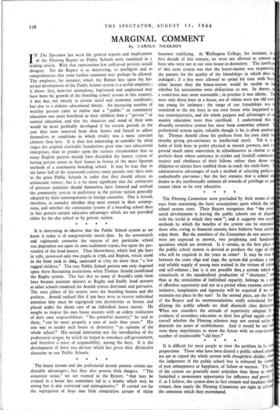The Fleming Committee were precluded by their terms of r
ence from examining the basic assumptions upon which the 15u school system rests. Their Report recognises that "the trend social development is leaving the public schools out of align with the world in which they exist "; and it suggests two exce methods by which the benefits of the system can be extended those who, owing to financial reasons, have hitherto been unable enjoy them. But the members of the Committee do not answer, were not expected to answer, two perplexing and fundam questions which are involved. Is it certain, in the first place the public school system is devised to produce the type of c who will be required in the years to come? It may be true between the years 1840 and 1940, the system did produce a r and reliable supply of young men trained in the virtues of tole and self-reliance; but is it not possible that, a system which consciously at the standardised production of "character," ra than at the stimulation of individual capacity, belongs to a p of effortless superiority and not to a period when extreme enterp initiative, imagination and ingenuity will be required if we an maintain our place in the sun? In the second place, are the fr of the Report and its recommendations really convinced that diluting the public schools we shall diminish class distin When one considers the attitude of superiority adopted by products of secondary education to their less gifted equals one oneself whether the Fleming schemes may not extend rather diminish the zones of snobbishness. And it would be sad were these experiments to strew the future with an ever-incr number of unadjustable "old boys."


























 Previous page
Previous page